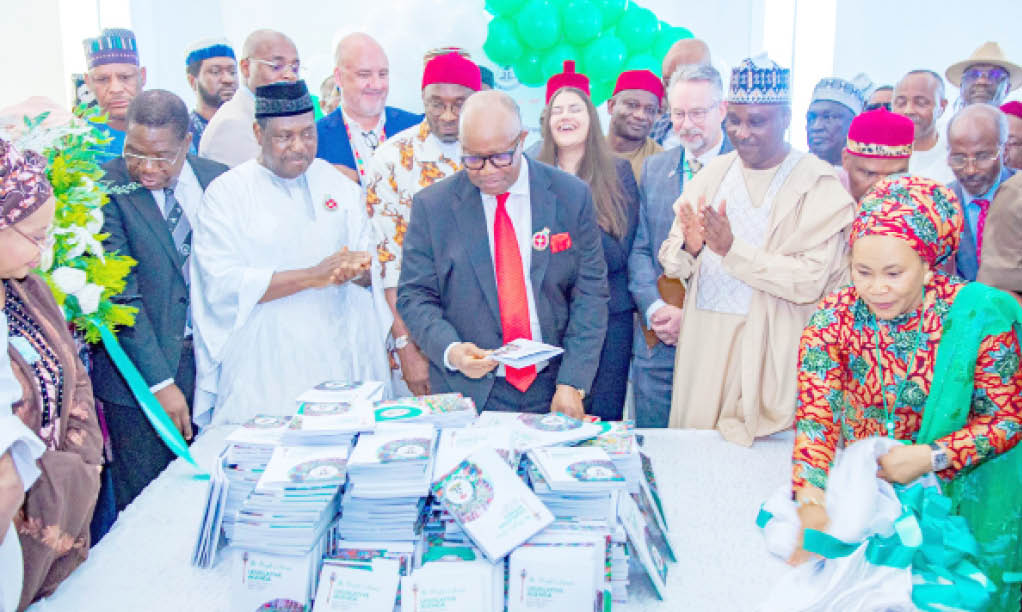In each legislative session of the National Assembly, members of the parliament usually draw up sets of legislative agenda that would form the fulcrum of their activities. Like the previous assemblies, the 10th House of Representatives, under the leadership of Speaker Abbas Tajudeen, has unveiled an ambitious 8-point agenda to drive the business of the Green Chamber in the next four years.
On November 14, Speaker Abbas unveiled the 8-point Legislative Agenda of the 10th House with a pledge to partner with President Bola Ahmed Tinubu on the successful implementation of the ‘Renewed Hope Agenda’ of the current administration.
The eight priority areas, according to the 126-page document unveiled include strengthening good governance, improving national security, law reform, economic growth and development, social sector reform and development, inclusion and open parliament, influencing/directing Nigeria’s foreign policy, climate change and environmental sustainability.
Abbas said the agenda was “a demonstration of our commitment to deploying every legislative instrument available to us towards meeting the yearnings and aspirations of the people we serve. We are dedicated to fostering an environment that promotes sustainable economic growth and development. We shall use every legislative tool at our disposal to create jobs for our teeming youths, address the challenge posed by poverty, improve infrastructure, ensure top quality and affordable health care, and provide security for all Nigerians.”
I can never feature in a film that negates Hausa culture, values – Aisha Najmu
FG launches revised mining guidelines for community development
Agenda 1: Strengthening Good Governance
This agenda focuses on the issues of rule of law and human rights, anti-corruption, improving the National Assembly delivery processes and enhancing Executive-Legislative Engagement.
The 10th House believes the rule of law is a fundamental principle of good governance and plays a crucial role in ensuring a just and equitable society; hence, its first agenda focuses on judicial reform, rule of law and human rights.
Under this agenda, the House said it was committed to passing a law to regulate the process of selection and appointment of judges, outlining detailed processes and requirements, as well as greater transparency and public involvement at all stages.
It plans to amend the constitution and relevant statutes to expand membership of the appointing institutions.
Others include establishing specialised courts to handle specific types of cases, which could expedite case resolution and reduce backlogs, as well as provide adequate resources for speedy dispensation of justice
The agenda also seeks to improve the remuneration of judges and judicial officers to minimise corruption, as well as support the introduction of a merit-based system in appointment and promotion of judges.
Agenda 2: Improving National Security
The second agenda of the House focuses on addressing the multifaceted security challenges bedeviling the country, which have negatively impacted the economy, reduced investor confidence and decreased productivity in vital sectors like agriculture and oil, among others.
To achieve this goal, the House plans to promote accountability in security sector funding and budgeting, as well as ensure efficient utilisation of resources, prevent corruption and enhance public trust in security institutions.
It plans to mandate regular independent audits of security sector expenditures and create or empower an independent body with the necessary clearances to perform these audits.
The House plans to pass the whistleblower protection law to encourage individuals within security agencies or related bodies to report financial malpractices without fear of retaliation.
Other aspects include strengthening intelligence gathering and sharing among security and intelligence agencies in enhancing national security.
Agenda 3: Law Reform
The third legislative agenda focuses on constitutional reform, local government reform, decongesting the exclusive legislative list, social and economic rights, judicial and legal system and electoral reform.
Among other things, it plans to introduce a constitutional alteration procedure law to provide a timeline for the passage of constitution alteration bills by the National Assembly and adoption by state Houses of Assembly.
Key among the proposed reform under this agenda is to plan to amend the constitution to provide constitutional roles for traditional institutions.
The agenda also covers the aspects of financial autonomy for local governments, electoral act amendment, decongesting the exclusive to allow states legislate on matters, such as aviation, including airports, carriage of passengers and goods by air; construction, alteration and maintenance of such roads; drugs and poisons; formation, annulment and dissolution of marriages and traffic on federal trunk roads, among others.
Agenda 4: Economic Growth and Development
The 4th agenda focuses on legislative interventions that will engender overall economic growth and development of the country.
The House believes that the country’s heavy reliance on the oil sector is unsustainable; hence, the need to create a more resilient and diversified economy that can provide opportunities for all Nigerians. It, therefore, plans to support economic diversification, with a focus on reducing dependence on oil and increasing development in other sectors across Nigeria, such as mineral resource mining, manufacturing, agroprocessing, textile, tourism and technology and general services.
The House also plans to provide incentives on tax breaks to encourage innovations and for industries that have the potential for job creation and export growth.
The House intends to use legislative measures to support the implementation of the African Continental Free Trade Agreement (AfCFTA) to open up markets and promote economic cooperation and growth.
Agenda 5: Social Sector Reform and Development
This agenda focuses on legislative interventions in critical areas, namely, education, health care, infrastructure, pension and reform.
Under education, the House will encourage measures through legislation, oversight and outreach to ensure the full achievement of Universal Basic Education, almajiri education and technical education in Nigeria.
Under infrastructure development, the House plans legislative interventions in the aspects of energy and power, roads and highway; rail transport, inland and waterways and aviation.
Specifically, the House said it would support the executive’s commitment to LNG and CNG-powered mass transit buses.
On rail, it plans to establish a dedicated fund for rail development, sourced from levies, taxes, and possibly a percentage of oil revenue, ensuring consistent funding for national rail projects.
In aviation, it plans to appropriate sufficient funds for upgrading and expanding airport infrastructure, including runways, terminals and air traffic control facilities.
Agenda 6: Inclusion and Open Parliament
The 6th Legislative Agenda of the 10th House focuses on inclusion and open parliament.
The House, by this agenda, aims at ensuring that its processes are more transparent, participatory and accountable, thus bolstering the overall democratic structure.
To achieve this agenda, the 10th House said it would re-introduce and support the bill on temporary special seats for women in the constitution amendment efforts of the 10th National Assembly.
It also intends to legislate to increase women’s representation in elective positions by creating special women-only seats in the Senate and House of Representatives, and encourage state Houses of Assembly to do the same.
The House said it would strengthen oversight of government institutions to ensure compliance with the National Gender Policy and court judgement on the full implementation of the 35 per cent affirmative action on appointive and elective positions in both public and private sectors.
Still on inclusion, the House intends to amend the Police Act 2022 to ensure uniformity in the enlistment requirements for men and women, amend the rule that excludes married women from enlisting in the police and delete the regulation that provides that unmarried women may only marry after they have served in the police for three years, subject to approval from a police commissioner.
The 10th House, which prides itself as the “People’s House,” said it would ensure that legislative processes are transparent by making its records, proceedings and decisions accessible to the public.
To achieve this, the House said it would, among other things, create a centralised digital portal for all legislative documents, including bills, votes and proceedings, official reports, committee reports etc.
It plans to strengthen the NASS TV to stream legislative sessions and committee meetings, provide regular broadcast slots for parliamentary proceedings and discussions on public television and radio.
The House said it would launch a dedicated website for the House of Representatives and the Office of the Speaker to make legislative documents available to the public and provide a mechanism for feedback.
Agenda 7: Influencing and Directing Foreign Policy
The 7th agenda of the 10th House focuses on influencing and directing the country’s foreign policy.
Under this agenda, the House, among other things, proposes legislative measures to provide a robust framework for Nigeria’s foreign policy, strengthening diplomatic relations, promoting economic interests, enhancing security cooperation, global peace and development and positioning Nigeria as an active and influential player in the international community.
Other areas of interventions include ensuring that foreign policy promotes and protects the interests of Nigeria and its citizens within and outside the country and guides diplomacy and multilateral relations with other countries and international bodies.
Agenda 8: Climate Change and Environmental Sustainability
The eighth agenda of the 10th Assembly focuses on climate change and environmental sustainability.
The House observed that Nigeria faced many environmental and climate change-related challenges, ranging from desertification, deforestation, flooding, oil pollution, erosion, waste management, loss of biodiversity, dwindling water resources and changing weather patterns that negatively impact agriculture.
One of the targets of the House is to strengthen the National Environmental Standards and Regulations Enforcement Agency (NESREA) to effectively enforce environmental laws, regulations and standards, and ensure compliance with international agreements, conventions and environmental treaties.
Under this agenda, the House specifically plans to ensure that Nigeria meets its commitment to reducing greenhouse gas emissions unconditionally by 20 per cent and conditionally by 45 per cent by 2030.
It also plans to legislate on measures to accelerate the transition to renewable energy sources and promote clean and sustainable energy production, access and consumption.
While these items of the agenda look all-encompassing and capable of meeting the yearnings of various constituents, the successful realisation of its goals will depend on effective implementation, cooperation with other branches of government and active engagement with Nigerians.

 Join Daily Trust WhatsApp Community For Quick Access To News and Happenings Around You.
Join Daily Trust WhatsApp Community For Quick Access To News and Happenings Around You.

